A Critical Analysis of Hegemony and Trade Policies in Global Economy
VerifiedAdded on 2023/04/06
|7
|1162
|397
Essay
AI Summary
This essay explores the hegemonic stability theory within the context of international political economy, arguing that while a dominant state can enforce mutually beneficial interests, it may undermine international democracy. The essay analyzes the United States' economic policies, such as tariff reforms and withdrawal from the Trans-Pacific Partnership, as examples of hegemonic influence. It also contrasts the state-centered and society-centered approaches to foreign economic policy determination, advocating for the state-centered approach due to its consideration of national welfare and domestic interests. The essay concludes that a balance between dependency theory and hegemonic stability theory is necessary for a fair global economic order, highlighting the importance of government intervention to protect consumer interests and promote national research and development.
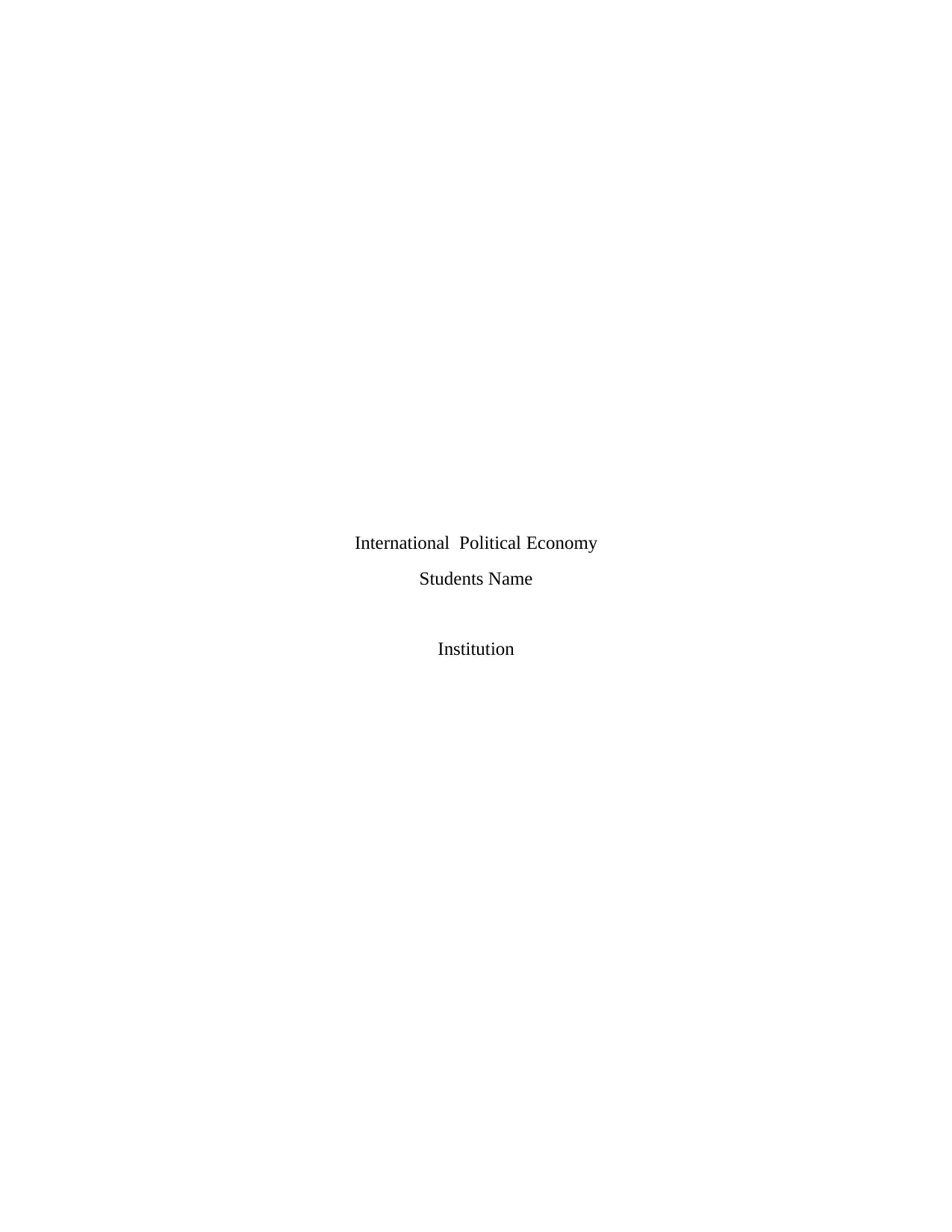
International Political Economy
Students Name
Institution
Students Name
Institution
Paraphrase This Document
Need a fresh take? Get an instant paraphrase of this document with our AI Paraphraser
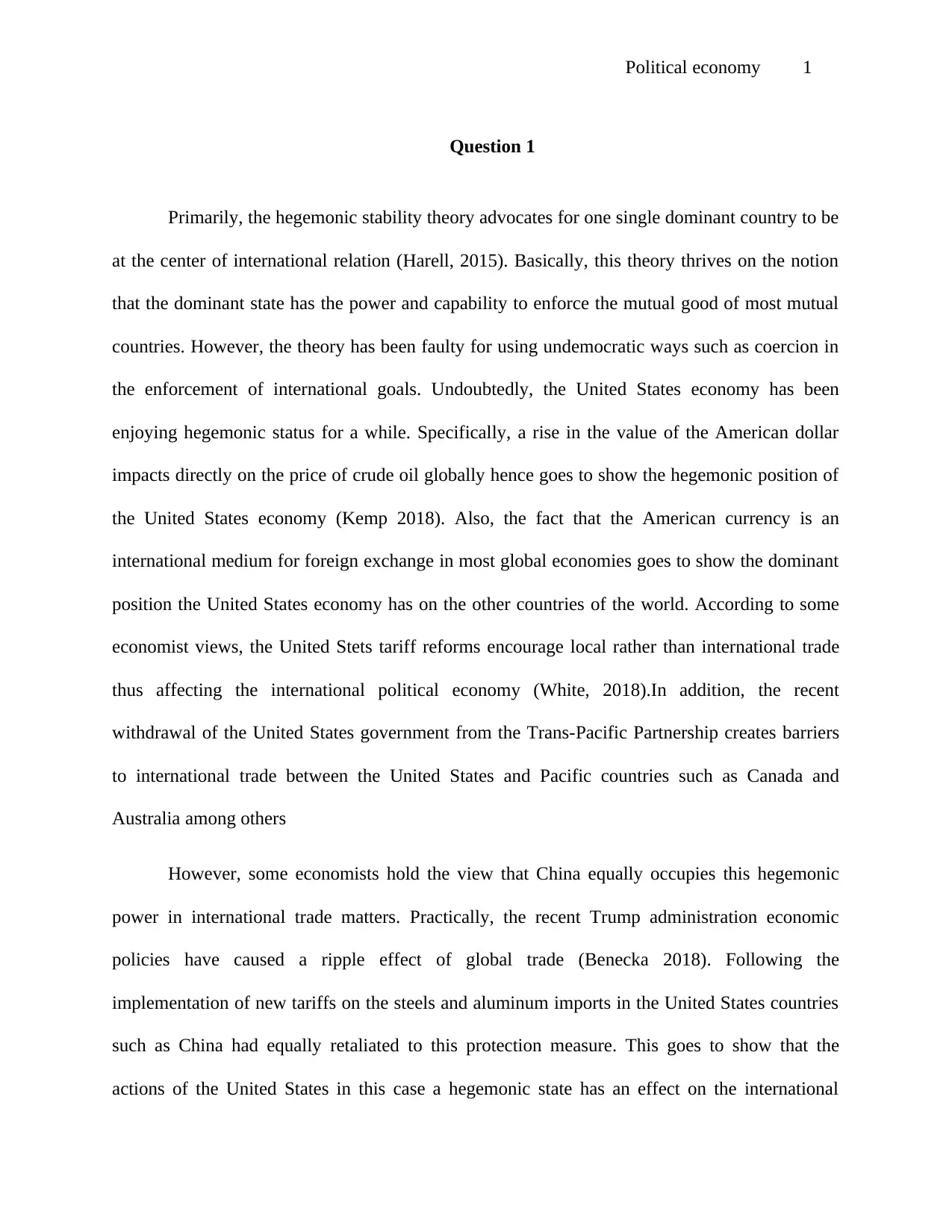
Political economy 1
Question 1
Primarily, the hegemonic stability theory advocates for one single dominant country to be
at the center of international relation (Harell, 2015). Basically, this theory thrives on the notion
that the dominant state has the power and capability to enforce the mutual good of most mutual
countries. However, the theory has been faulty for using undemocratic ways such as coercion in
the enforcement of international goals. Undoubtedly, the United States economy has been
enjoying hegemonic status for a while. Specifically, a rise in the value of the American dollar
impacts directly on the price of crude oil globally hence goes to show the hegemonic position of
the United States economy (Kemp 2018). Also, the fact that the American currency is an
international medium for foreign exchange in most global economies goes to show the dominant
position the United States economy has on the other countries of the world. According to some
economist views, the United Stets tariff reforms encourage local rather than international trade
thus affecting the international political economy (White, 2018).In addition, the recent
withdrawal of the United States government from the Trans-Pacific Partnership creates barriers
to international trade between the United States and Pacific countries such as Canada and
Australia among others
However, some economists hold the view that China equally occupies this hegemonic
power in international trade matters. Practically, the recent Trump administration economic
policies have caused a ripple effect of global trade (Benecka 2018). Following the
implementation of new tariffs on the steels and aluminum imports in the United States countries
such as China had equally retaliated to this protection measure. This goes to show that the
actions of the United States in this case a hegemonic state has an effect on the international
Question 1
Primarily, the hegemonic stability theory advocates for one single dominant country to be
at the center of international relation (Harell, 2015). Basically, this theory thrives on the notion
that the dominant state has the power and capability to enforce the mutual good of most mutual
countries. However, the theory has been faulty for using undemocratic ways such as coercion in
the enforcement of international goals. Undoubtedly, the United States economy has been
enjoying hegemonic status for a while. Specifically, a rise in the value of the American dollar
impacts directly on the price of crude oil globally hence goes to show the hegemonic position of
the United States economy (Kemp 2018). Also, the fact that the American currency is an
international medium for foreign exchange in most global economies goes to show the dominant
position the United States economy has on the other countries of the world. According to some
economist views, the United Stets tariff reforms encourage local rather than international trade
thus affecting the international political economy (White, 2018).In addition, the recent
withdrawal of the United States government from the Trans-Pacific Partnership creates barriers
to international trade between the United States and Pacific countries such as Canada and
Australia among others
However, some economists hold the view that China equally occupies this hegemonic
power in international trade matters. Practically, the recent Trump administration economic
policies have caused a ripple effect of global trade (Benecka 2018). Following the
implementation of new tariffs on the steels and aluminum imports in the United States countries
such as China had equally retaliated to this protection measure. This goes to show that the
actions of the United States in this case a hegemonic state has an effect on the international
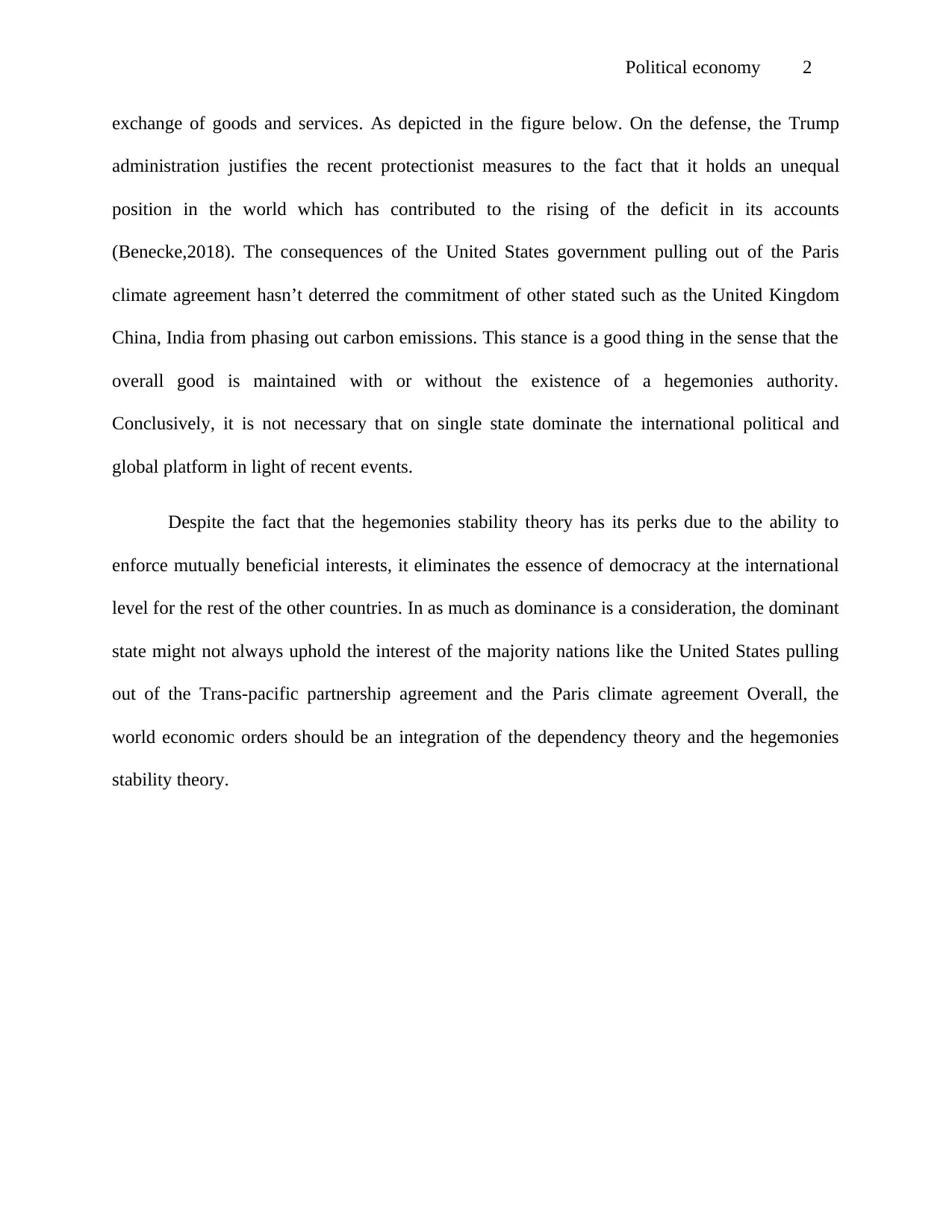
Political economy 2
exchange of goods and services. As depicted in the figure below. On the defense, the Trump
administration justifies the recent protectionist measures to the fact that it holds an unequal
position in the world which has contributed to the rising of the deficit in its accounts
(Benecke,2018). The consequences of the United States government pulling out of the Paris
climate agreement hasn’t deterred the commitment of other stated such as the United Kingdom
China, India from phasing out carbon emissions. This stance is a good thing in the sense that the
overall good is maintained with or without the existence of a hegemonies authority.
Conclusively, it is not necessary that on single state dominate the international political and
global platform in light of recent events.
Despite the fact that the hegemonies stability theory has its perks due to the ability to
enforce mutually beneficial interests, it eliminates the essence of democracy at the international
level for the rest of the other countries. In as much as dominance is a consideration, the dominant
state might not always uphold the interest of the majority nations like the United States pulling
out of the Trans-pacific partnership agreement and the Paris climate agreement Overall, the
world economic orders should be an integration of the dependency theory and the hegemonies
stability theory.
exchange of goods and services. As depicted in the figure below. On the defense, the Trump
administration justifies the recent protectionist measures to the fact that it holds an unequal
position in the world which has contributed to the rising of the deficit in its accounts
(Benecke,2018). The consequences of the United States government pulling out of the Paris
climate agreement hasn’t deterred the commitment of other stated such as the United Kingdom
China, India from phasing out carbon emissions. This stance is a good thing in the sense that the
overall good is maintained with or without the existence of a hegemonies authority.
Conclusively, it is not necessary that on single state dominate the international political and
global platform in light of recent events.
Despite the fact that the hegemonies stability theory has its perks due to the ability to
enforce mutually beneficial interests, it eliminates the essence of democracy at the international
level for the rest of the other countries. In as much as dominance is a consideration, the dominant
state might not always uphold the interest of the majority nations like the United States pulling
out of the Trans-pacific partnership agreement and the Paris climate agreement Overall, the
world economic orders should be an integration of the dependency theory and the hegemonies
stability theory.
⊘ This is a preview!⊘
Do you want full access?
Subscribe today to unlock all pages.

Trusted by 1+ million students worldwide
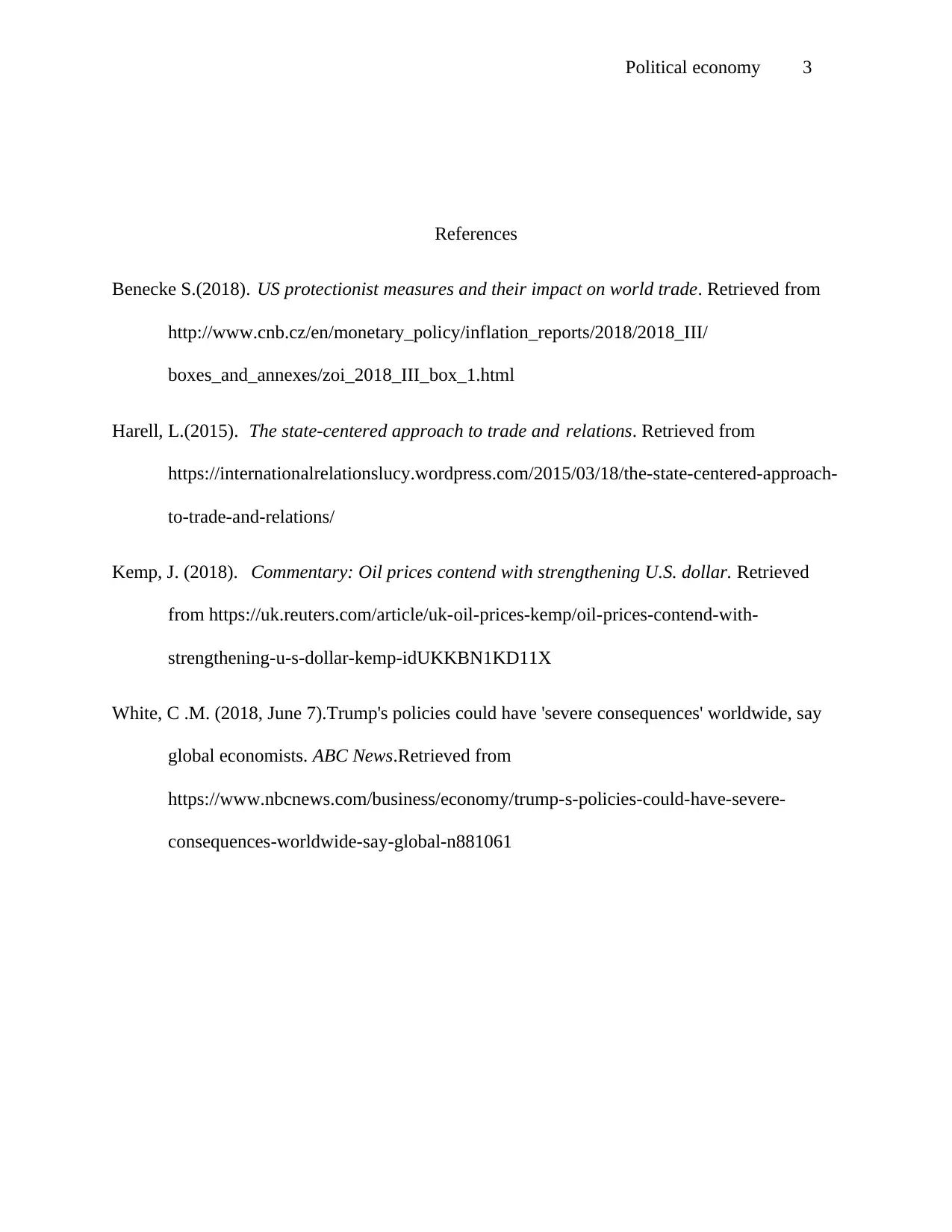
Political economy 3
References
Benecke S.(2018). US protectionist measures and their impact on world trade. Retrieved from
http://www.cnb.cz/en/monetary_policy/inflation_reports/2018/2018_III/
boxes_and_annexes/zoi_2018_III_box_1.html
Harell, L.(2015). The state-centered approach to trade and relations. Retrieved from
https://internationalrelationslucy.wordpress.com/2015/03/18/the-state-centered-approach-
to-trade-and-relations/
Kemp, J. (2018). Commentary: Oil prices contend with strengthening U.S. dollar. Retrieved
from https://uk.reuters.com/article/uk-oil-prices-kemp/oil-prices-contend-with-
strengthening-u-s-dollar-kemp-idUKKBN1KD11X
White, C .M. (2018, June 7).Trump's policies could have 'severe consequences' worldwide, say
global economists. ABC News.Retrieved from
https://www.nbcnews.com/business/economy/trump-s-policies-could-have-severe-
consequences-worldwide-say-global-n881061
References
Benecke S.(2018). US protectionist measures and their impact on world trade. Retrieved from
http://www.cnb.cz/en/monetary_policy/inflation_reports/2018/2018_III/
boxes_and_annexes/zoi_2018_III_box_1.html
Harell, L.(2015). The state-centered approach to trade and relations. Retrieved from
https://internationalrelationslucy.wordpress.com/2015/03/18/the-state-centered-approach-
to-trade-and-relations/
Kemp, J. (2018). Commentary: Oil prices contend with strengthening U.S. dollar. Retrieved
from https://uk.reuters.com/article/uk-oil-prices-kemp/oil-prices-contend-with-
strengthening-u-s-dollar-kemp-idUKKBN1KD11X
White, C .M. (2018, June 7).Trump's policies could have 'severe consequences' worldwide, say
global economists. ABC News.Retrieved from
https://www.nbcnews.com/business/economy/trump-s-policies-could-have-severe-
consequences-worldwide-say-global-n881061
Paraphrase This Document
Need a fresh take? Get an instant paraphrase of this document with our AI Paraphraser
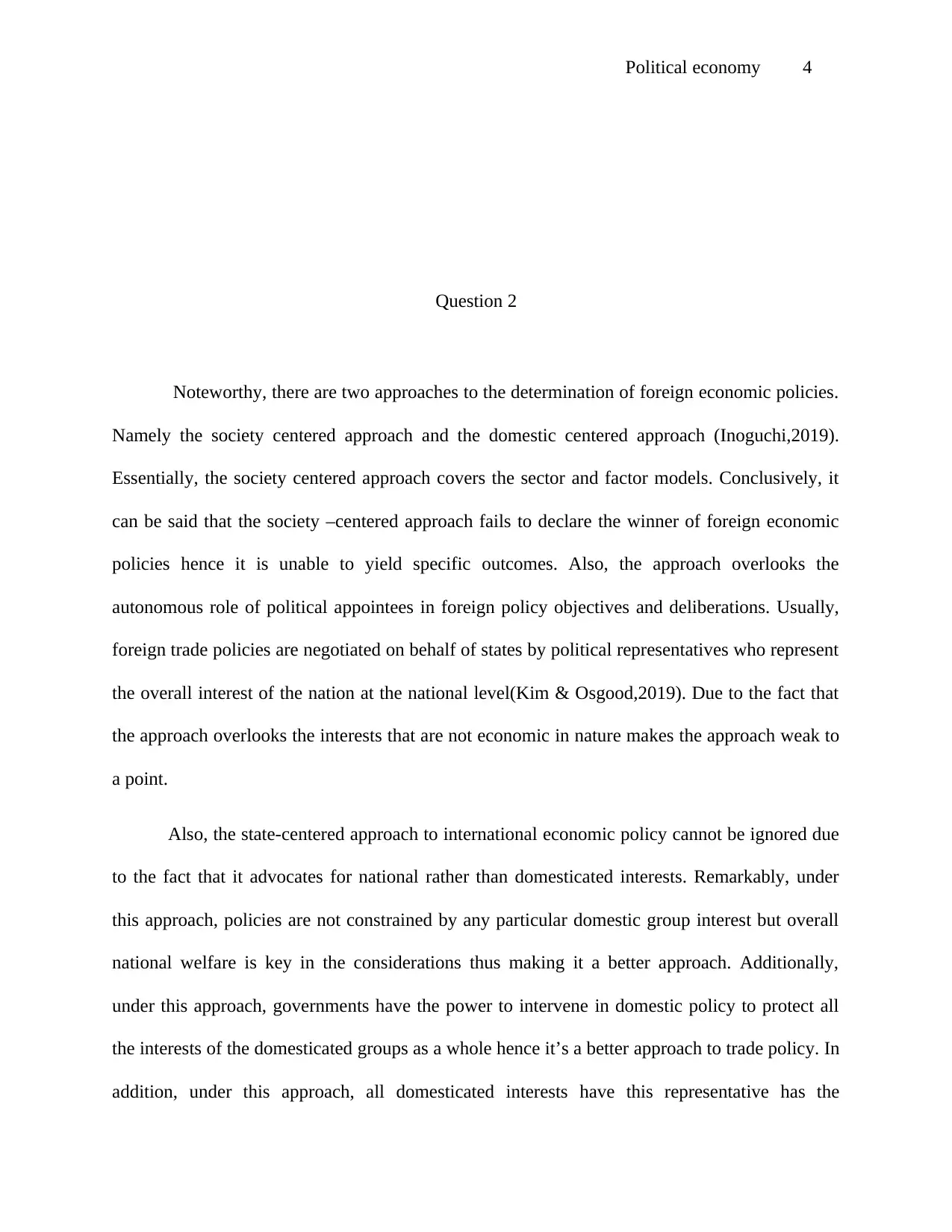
Political economy 4
Question 2
Noteworthy, there are two approaches to the determination of foreign economic policies.
Namely the society centered approach and the domestic centered approach (Inoguchi,2019).
Essentially, the society centered approach covers the sector and factor models. Conclusively, it
can be said that the society –centered approach fails to declare the winner of foreign economic
policies hence it is unable to yield specific outcomes. Also, the approach overlooks the
autonomous role of political appointees in foreign policy objectives and deliberations. Usually,
foreign trade policies are negotiated on behalf of states by political representatives who represent
the overall interest of the nation at the national level(Kim & Osgood,2019). Due to the fact that
the approach overlooks the interests that are not economic in nature makes the approach weak to
a point.
Also, the state-centered approach to international economic policy cannot be ignored due
to the fact that it advocates for national rather than domesticated interests. Remarkably, under
this approach, policies are not constrained by any particular domestic group interest but overall
national welfare is key in the considerations thus making it a better approach. Additionally,
under this approach, governments have the power to intervene in domestic policy to protect all
the interests of the domesticated groups as a whole hence it’s a better approach to trade policy. In
addition, under this approach, all domesticated interests have this representative has the
Question 2
Noteworthy, there are two approaches to the determination of foreign economic policies.
Namely the society centered approach and the domestic centered approach (Inoguchi,2019).
Essentially, the society centered approach covers the sector and factor models. Conclusively, it
can be said that the society –centered approach fails to declare the winner of foreign economic
policies hence it is unable to yield specific outcomes. Also, the approach overlooks the
autonomous role of political appointees in foreign policy objectives and deliberations. Usually,
foreign trade policies are negotiated on behalf of states by political representatives who represent
the overall interest of the nation at the national level(Kim & Osgood,2019). Due to the fact that
the approach overlooks the interests that are not economic in nature makes the approach weak to
a point.
Also, the state-centered approach to international economic policy cannot be ignored due
to the fact that it advocates for national rather than domesticated interests. Remarkably, under
this approach, policies are not constrained by any particular domestic group interest but overall
national welfare is key in the considerations thus making it a better approach. Additionally,
under this approach, governments have the power to intervene in domestic policy to protect all
the interests of the domesticated groups as a whole hence it’s a better approach to trade policy. In
addition, under this approach, all domesticated interests have this representative has the
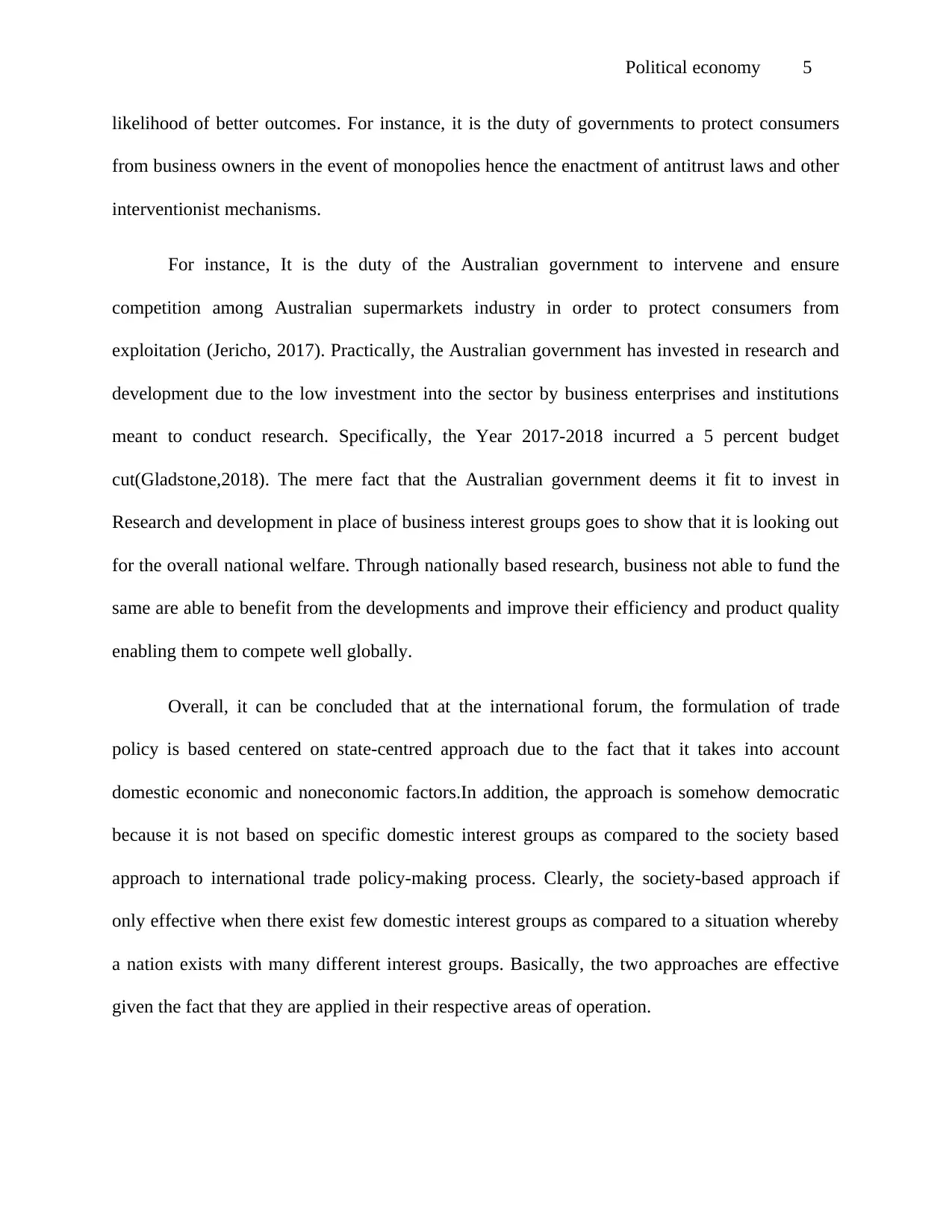
Political economy 5
likelihood of better outcomes. For instance, it is the duty of governments to protect consumers
from business owners in the event of monopolies hence the enactment of antitrust laws and other
interventionist mechanisms.
For instance, It is the duty of the Australian government to intervene and ensure
competition among Australian supermarkets industry in order to protect consumers from
exploitation (Jericho, 2017). Practically, the Australian government has invested in research and
development due to the low investment into the sector by business enterprises and institutions
meant to conduct research. Specifically, the Year 2017-2018 incurred a 5 percent budget
cut(Gladstone,2018). The mere fact that the Australian government deems it fit to invest in
Research and development in place of business interest groups goes to show that it is looking out
for the overall national welfare. Through nationally based research, business not able to fund the
same are able to benefit from the developments and improve their efficiency and product quality
enabling them to compete well globally.
Overall, it can be concluded that at the international forum, the formulation of trade
policy is based centered on state-centred approach due to the fact that it takes into account
domestic economic and noneconomic factors.In addition, the approach is somehow democratic
because it is not based on specific domestic interest groups as compared to the society based
approach to international trade policy-making process. Clearly, the society-based approach if
only effective when there exist few domestic interest groups as compared to a situation whereby
a nation exists with many different interest groups. Basically, the two approaches are effective
given the fact that they are applied in their respective areas of operation.
likelihood of better outcomes. For instance, it is the duty of governments to protect consumers
from business owners in the event of monopolies hence the enactment of antitrust laws and other
interventionist mechanisms.
For instance, It is the duty of the Australian government to intervene and ensure
competition among Australian supermarkets industry in order to protect consumers from
exploitation (Jericho, 2017). Practically, the Australian government has invested in research and
development due to the low investment into the sector by business enterprises and institutions
meant to conduct research. Specifically, the Year 2017-2018 incurred a 5 percent budget
cut(Gladstone,2018). The mere fact that the Australian government deems it fit to invest in
Research and development in place of business interest groups goes to show that it is looking out
for the overall national welfare. Through nationally based research, business not able to fund the
same are able to benefit from the developments and improve their efficiency and product quality
enabling them to compete well globally.
Overall, it can be concluded that at the international forum, the formulation of trade
policy is based centered on state-centred approach due to the fact that it takes into account
domestic economic and noneconomic factors.In addition, the approach is somehow democratic
because it is not based on specific domestic interest groups as compared to the society based
approach to international trade policy-making process. Clearly, the society-based approach if
only effective when there exist few domestic interest groups as compared to a situation whereby
a nation exists with many different interest groups. Basically, the two approaches are effective
given the fact that they are applied in their respective areas of operation.
⊘ This is a preview!⊘
Do you want full access?
Subscribe today to unlock all pages.

Trusted by 1+ million students worldwide
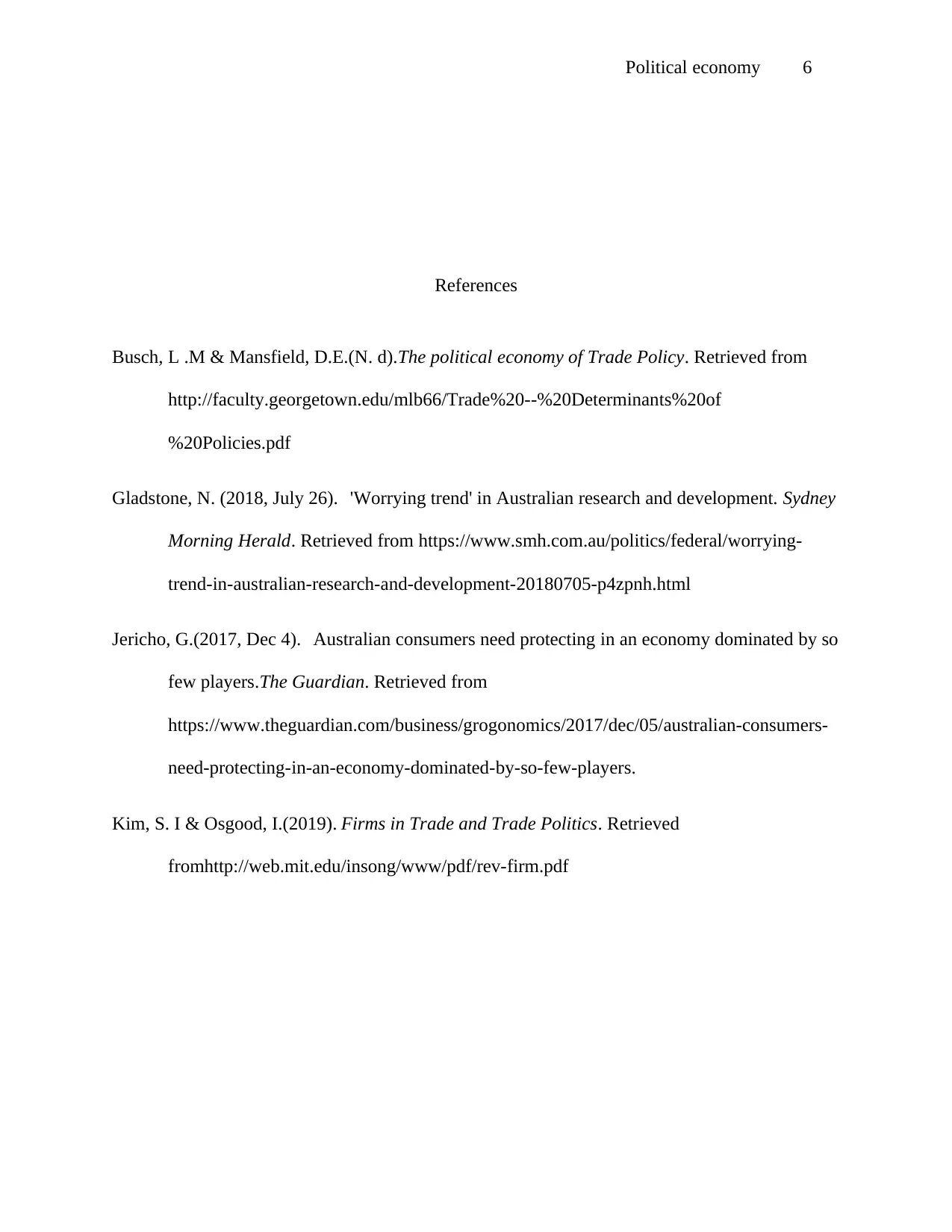
Political economy 6
References
Busch, L .M & Mansfield, D.E.(N. d).The political economy of Trade Policy. Retrieved from
http://faculty.georgetown.edu/mlb66/Trade%20--%20Determinants%20of
%20Policies.pdf
Gladstone, N. (2018, July 26). 'Worrying trend' in Australian research and development. Sydney
Morning Herald. Retrieved from https://www.smh.com.au/politics/federal/worrying-
trend-in-australian-research-and-development-20180705-p4zpnh.html
Jericho, G.(2017, Dec 4). Australian consumers need protecting in an economy dominated by so
few players.The Guardian. Retrieved from
https://www.theguardian.com/business/grogonomics/2017/dec/05/australian-consumers-
need-protecting-in-an-economy-dominated-by-so-few-players.
Kim, S. I & Osgood, I.(2019). Firms in Trade and Trade Politics. Retrieved
fromhttp://web.mit.edu/insong/www/pdf/rev-firm.pdf
References
Busch, L .M & Mansfield, D.E.(N. d).The political economy of Trade Policy. Retrieved from
http://faculty.georgetown.edu/mlb66/Trade%20--%20Determinants%20of
%20Policies.pdf
Gladstone, N. (2018, July 26). 'Worrying trend' in Australian research and development. Sydney
Morning Herald. Retrieved from https://www.smh.com.au/politics/federal/worrying-
trend-in-australian-research-and-development-20180705-p4zpnh.html
Jericho, G.(2017, Dec 4). Australian consumers need protecting in an economy dominated by so
few players.The Guardian. Retrieved from
https://www.theguardian.com/business/grogonomics/2017/dec/05/australian-consumers-
need-protecting-in-an-economy-dominated-by-so-few-players.
Kim, S. I & Osgood, I.(2019). Firms in Trade and Trade Politics. Retrieved
fromhttp://web.mit.edu/insong/www/pdf/rev-firm.pdf
1 out of 7
Related Documents
Your All-in-One AI-Powered Toolkit for Academic Success.
+13062052269
info@desklib.com
Available 24*7 on WhatsApp / Email
![[object Object]](/_next/static/media/star-bottom.7253800d.svg)
Unlock your academic potential
Copyright © 2020–2026 A2Z Services. All Rights Reserved. Developed and managed by ZUCOL.





